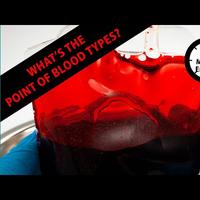What's the point of blood types? - 6 Minute English - YouTube
Hello. This is 6 Minute English from BBC Learning
English. I'm Neil.
And I'm Sam.
Sam, what blood type are you?
Ah, you mean the different groups used to
classify humans by blood – types A, B, AB
and O. I think I'm type O. How about you,
Neil?
Well, it may sound strange but actually I
don't know.
Hmm, lots of westerners don't know their
blood type, but in parts of Asia blood groups
are a topic of daily conversation. People
select romantic partners based on blood type
and different blood groups are associated
with different personalities.
In this programme we'll be finding out all
about blood – why humans have different
blood types and whether blood is something
more than just a way of pumping oxygen around
your body.
And of course we'll be learning some new
vocabulary as well. Now, Neil, I have an interesting
fact for you - did you know that many Japanese
popstars' websites will feature their blood
type alongside information like their age
and hobbies?
I didn't, Sam, but Japanese culture is certainly
interested in blood. There's even a word
‘burahara' meaning ‘blood harassment',
which is used to describe hostility towards
people from a certain blood group considered
to be selfish – but which group? That's
my quiz question for today – which blood
types may fall victim to ‘burahara'?
Is it:
a) blood type A? b) blood type B? Or
c) blood type O?
I'll say a) blood type A.
OK, Sam, we'll find out the answer later.
As we've heard, blood is a big deal in Japan.
Marnie Chesterton, from BBC World Service
programme, CrowdScience, travelled to Tokyo
where she asked Japanese translator,
Chie Kobayashi, to explain more:
For blood type A, generally it is thought
they are perfectionists, more detail-oriented,
pretty much good at precise type jobs, and
that makes them good at helping others and
good at teamwork and respecting rules and
customs. That's a typical blood A type.
40 percent of Japan's population are sensitive,
anxious type As. 30 percent are curious and
stubborn, generous type Os. Ten percent are
creative ABs. But woe betide the twenty percent
type B because they have a far less desirable
personality, apparently.
According to Japanese tradition, blood type
As are perfectionists - people who want everything
to be perfect and demand the highest standards
possible.
This contrasts with type Os who are considered
to be stubborn – people who are determined
to do what they want and refuse to change
their mind.
But it's unfortunate blood type Bs who have
the least desirable personality – selfish
and independent. “Woe betide the type Bs”
remarks the presenter, Marnie Chesterton – an
informal British expression said when there
will be trouble ahead for someone – in this
case, poor type Bs!
But apart from customs and traditions, is
there actually any science behind these beliefs?
Well, not according to Dr Emma Pomeroy of
Cambridge University's archaeology department.
She thinks that - like horoscopes – there's
no scientific basis for a connection between
blood types and personalities.
Which makes me wonder what exactly
blood types are.
Blood types are kinds of stickers or chemical
markers which support our immune system
- the organs, cells and processes which protect
the human body from infection and illness.
Those chemical markers can identify foreign
bodies like pathogens - small organisms, such
a virus or bacteria, that can cause disease.
The variety of blood types seems to be a result
of different bodily responses to different
disease-causing pathogens.
Which explains why blood of the same type
is needed in blood transfusions – medical
procedures in which blood is taken from one
person and put into another person's body,
often after an accident or during an operation.
And explains the high demand for type O blood
which can be given to anyone.
Ah, generous type Os – like me. I always
knew I was special… and curious and stubborn,
wasn't that the type O personality?
Oh yes, today's quiz question was about
blood type personalities. I asked you which
undesirable blood type is considered selfish
in Japan.
I said a) blood type A.
But as we've heard, it's actually b) blood
type B.
Never mind, I'll settle for being curious,
stubborn and generous! In today's programme
we've been talking all about blood types
and personalities. In Japan, blood type A
people are thought of as perfectionists - people
who want everything to be perfect.
Unlike type Os who are considered stubborn
– determined to get their own way and unwilling
to change.
And woe betide selfish type Bs – an informal
expression said when there will be trouble
for someone or if they will be punished for
doing a particular thing.
Scientifically speaking, blood types help
support our immune system - the organs and
cellular processes which protect the human
body from infection.
They also help identify foreign pathogens
- small organisms, such a virus or bacteria,
that can cause a disease.
And explain why the same blood type is needed
for a successful blood transfusion – the
procedure in which blood is transferred from
one person's body to another during an operation.
That's all we have time for today. Bye for
now.
Bye!

